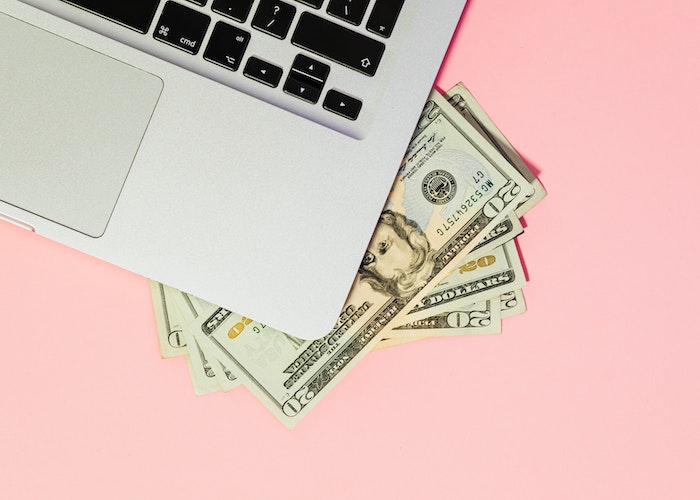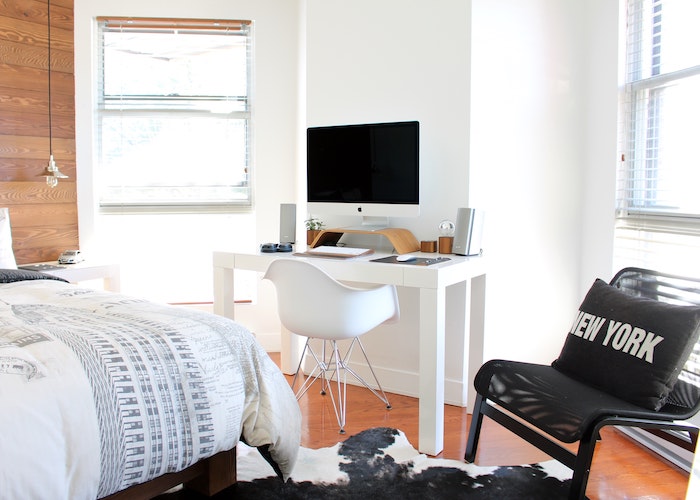The Easy First Step I Took To Drastically Lower My Debt

“I’d just use one debt to pay the other because I didn’t see any other way out…”
Like most millennials, I spent the majority of my twenties incapable of financial control. I didn’t realize it then, but at the time, I was shrouded in a weighted blanket of anxiety. Some deeply devastating things were happening in my family life, and I didn’t have the tools or the professional help I needed to navigate that period of my life.
I was so frustrated with myself. I would sleep for 10-12 hours a night. I would take the easiest way out of any decision. My ambition was suppressed by my sadness and my fear of truly facing and confronting anything that was challenging. As for my finances? They were a feat, to say the least.
To take it from the top — when I moved out of an apartment during grad school, I did the responsible thing and called the cable company to cancel my subscription. Months later, I received notice that I owed hundreds of dollars. It turns out the company didn’t cancel my subscription, and I was still being charged for cable that I can only assume the next renter was enjoying. I didn’t have the money to pay the outstanding balance so I disputed the charges, instead. The cable provider apologized and said everything was cleared up, however, just a few more months later, a debt collector called me and told me I owed hundreds of dollars to the company.
This would later become an ongoing saga with how I handled my finances; oftentimes, I just couldn’t face them. I would ignore calls from collectors, and I’d try to pretend there wasn’t a problem. Finally, after about two years of doing this, I just gave in and used one debt to pay the other (hello, credit cards), because I didn’t see another way out. Besides, by then, I had lost any receipts proving that I didn’t actually owe the cable company any money.
In short — it all felt impossible to confront.
Anxiety is so hard to describe, primarily because while you’re in it, everything feels impossible. Your brain is constantly on hyperdrive so that when a problem does come up, your first emotional response is to panic, and in my case, under-function, in a response to fear. I shut down, I grow exhausted and I often indulge in social media or TV to calm down and escape the feelings of impossibility. I also hit “Ignore” on calls from unknown numbers that I assume are debt collectors.
It took a long time – and a lot of trial and error – to start therapy and to learn that I didn’t have to live like this.
At the start of 2020, I found a therapist who I finally clicked with and whose strategies I discovered were helping me. Each week, I would take the Metro (commute) to her office to talk, cry, and uncover what was at the root of my emotions. Even her asking me seemingly simple questions led me down a path to my childhood. Each week, along with uprooting metaphorical soil and emotional turmoil, we were discovering the rocks of anxiety that were weighing so heavily on my head, heart, and shoulders. Through all of this, I didn’t have a clue that all this uprooting would also help me to better see how intertwined my anxiety was to my actual finances.
Each session, in talking through my overwhelming experiences and investigating how they made me feel (and in turn, act), I felt myself growing lighter. Slowly but surely, I was able to take on tasks that previously felt impossible, like writing down my weekly spending habits and opening up my bank account each morning to see where I had spent money. I’d begun to do all this without falling into an anxious, shaming spiral, as I’d done in the past.
In Toni Morrison’s novel, Song of Solomon, one character, Pilate, notes that “You wanna fly, you gotta give up the sh*t that weighs you down.” As I began to let go of all that weighed me down, I was able to think more clearly. I was able to start with small-passive tasks (following financial blogs on Instagram and reading finance books), to medium-passive tasks (like opening up a high-yield savings account and putting a percentage of my paycheck towards it every month). It has been a long and slow process, but I have begun taking on larger tasks over time that are bringing me closer and closer to a healthy financial life.
In my last (virtual) therapy session, I had a breakthrough that left me sobbing tears of relief in my bed; I realized that I dictate my life, my space, and my emotional journey. This led me to sit down and type out every single expense I had in June. I then categorized each expense so that I could see where I was spending my money. In doing so, I realized that some expenses brought back happy memories, like buying the plants that now bring me so much joy, while some were just avoidant expenses, like going to get fast food rather than go to the mid-pandemic, anxiety-inducing grocery store to get food to cook. I saw where I overspent, and I saw how spending can sometimes be a good thing — sometimes it is enjoyable, and sometimes it is just completely unnecessary and unfulfilling.
In the end, I was able to emotionally examine my spending without feeling the unbearable weight of anxiety slowly crushing me.
Every day, I am learning more about myself, and by budgeting and taking control of my money. Now, I open myself to dreams of owning a home, traveling without stress, and living a debt-free life.
(This article was originally published October 2020)
Samantha is a writer, reader, and binge-watching aficionado. She spends her free time running, cooking, baking, trying to keep plants alive, and eating all the food in the greater Washington, DC area. Follow her on Instagram and send DMV ramen recommendations to @superfluoussam
Image via Unsplash




